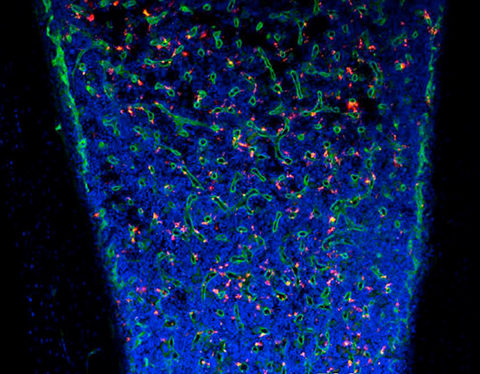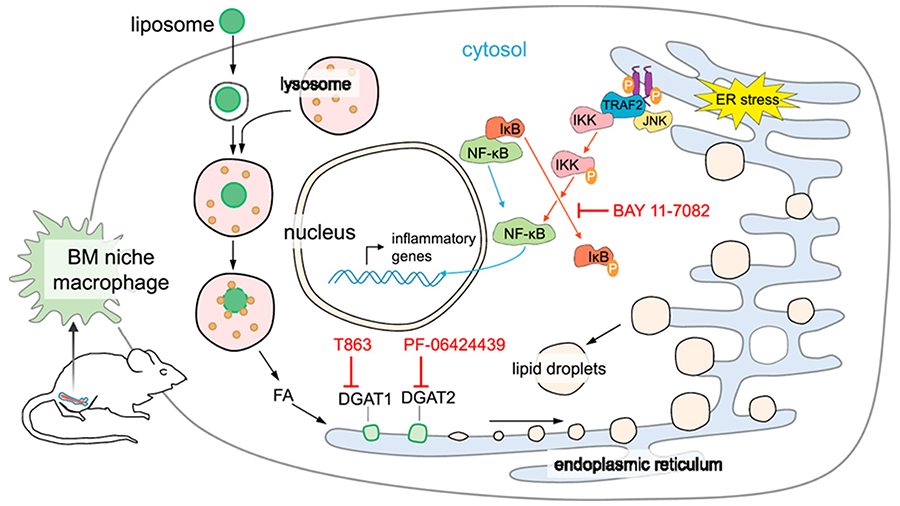A downside to liposome drug delivery?
Precisely targeting a drug to the right part of the body is always hard, but drug delivery is at its most challenging when the therapeutic is genetic material.
Unlike other classes of biologic drugs, DNA and RNA are not stable in circulation, so scientists have used lipid capsules called liposomes to envelop the therapeutic genes and shuttle them safely to the appropriate destination.
The human body treats engineered liposomes — and all drugs — like foreign objects. Upon injection, the immune system reacts to the circulating lipid capsules, and the white blood cells known as macrophages begin engulfing and clearing the perceived intruders.

For many years, this phenomenon was not a problem, according to Yue Li, a researcher at Xuzhou Medical University in Jiangsu, China.
“In recent decades, countless nanoparticles have been designed for drug delivery, and there are over 20 liposomal products available on the market,” Li said.
These medicines have been shown to be safe and effective by regulatory agencies such as the United States Food and Drug Administration.
However, in a study published in the Journal of Lipid Research, Li, along with co–first author Ran Yao and colleagues, showed that liposomes can have a negative impact on bone marrow macrophages.
These scientists knew that as macrophages encounter and engulf liposomes, they begin to accumulate lipid droplets. Researchers had put this to clever use delivering fluorescent labels into immune cells during lab experiments, but Li realized that the same phenomenon might be occurring when liposomes are administered as drugs. Indeed, previous work had shown it occurs in the liver.
To test the theory, Li and a team of researchers at the Xuzhou Medical University injected mice with liposomes and then collected macrophages from the mouse bone marrow for study. The result is stunning: Macrophages in the bone marrow underwent pro-inflammatory activation and showed signs of stress, such as lipid accumulation in the endoplasmic reticulum. This led to a decreased ability to create red blood cells and important immune cell types like monocytes.
What does this mean? Li said he thinks the finding “provides a novel consideration criteria for clinical drug trials.” That is, patients who are immunocompromised or who have bone marrow infections might need to avoid liposome drug trials.
While this may be true, the finding must be replicated in human macrophages and tissue samples before researchers can be sure. The work also should be extended beyond liposomes to other classes of lipid nanoparticles.
It’s not all bad news for liposomal drugs, either. For years, researchers have worked to engineer the surface of nanoparticles to escape immune detection. The original motivation was to increase effectiveness by keeping the drug in circulation longer. Now, those modifications may have a secondary benefit: sparing the hardworking bone marrow macrophages.

Enjoy reading ASBMB Today?
Become a member to receive the print edition four times a year and the digital edition monthly.
Learn moreGet the latest from ASBMB Today
Enter your email address, and we’ll send you a weekly email with recent articles, interviews and more.
Latest in Science
Science highlights or most popular articles

Avoiding common figure errors in manuscript submissions
The three figure issues most often flagged during JBC’s data integrity review are background signal errors, image reuse and undeclared splicing errors. Learn how to avoid these and prevent mistakes that could impede publication.

Ragweed compound thwarts aggressive bladder and breast cancers
Scientists from the University of Michigan reveal the mechanism of action of ambrosin, a compound from ragweed, selectively attacks advanced bladder and breast cancer cells in cell-based models, highlighting its potential to treat advanced tumors.

Lipid-lowering therapies could help treat IBD
Genetic evidence shows that drugs that reduce cholesterol or triglyceride levels can either raise or lower inflammatory bowel disease risk by altering gut microbes and immune signaling.

Key regulator of cholesterol protects against Alzheimer’s disease
A new study identifies oxysterol-binding protein-related protein 6 as a central controller of brain cholesterol balance, with protective effects against Alzheimer’s-related neurodegeneration.

From humble beginnings to unlocking lysosomal secrets
Monther Abu–Remaileh will receive the ASBMB’s 2026 Walter A. Shaw Young Investigator Award in Lipid Research at the ASBMB Annual Meeting, March 7-10 in Washington, D.C.

Chemistry meets biology to thwart parasites
Margaret Phillips will receive the Alice and C. C. Wang Award in Molecular Parasitology at the ASBMB Annual Meeting, March 7-10 in Washington, D.C.

